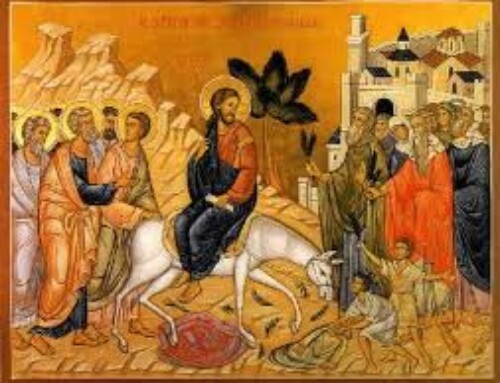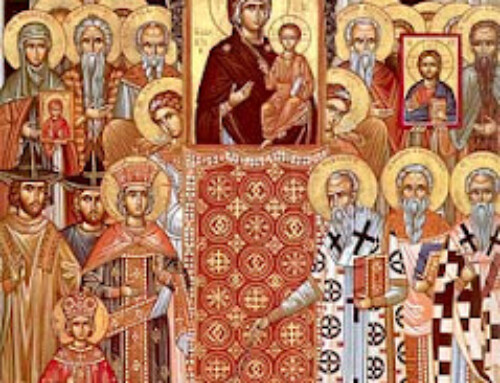From The Word Magazine, February, 1993, Page 4 – 5
ORTHODOX LENT: A FEAST FOR THE SOUL
By Father Alexey Young
“Moses was before the Lord forty days and forty nights; he did not eat bread, and he did not drink water.” (Exodus 24:28)
“Jesus was led up of the Spirit into the wilderness to be tempted of the devil, and fasted forty days and forty nights.” (Matt. 4:1-2)
Lent, a “feast” for the soul? Ha!
This is the response of many people, as they see Lent approaching. They begin to groan and complain inwardly already feeling terribly “deprived of their hamburgers and T-Bone steaks. This is because — in our materialistic society where we have learned to identify ourselves through self-indulgence— we tend to see Lent only as a time of deprivation and penance, of not eating meat and having to attend more divine services.
But this is not at all the Orthodox view of Lent. The Lord explicitly told us not to define ourselves in terms of the body and comfort. Nor do we fast from certain foods in order to punish ourselves or in some way “atone” for our sins. On the Cross, Jesus Christ took all our sins upon Himself; therefore nothing we do can “merit” salvation and forgiveness. These have already been freely given to us by God.
But if Lent is not a season of penitential exercises, what is it, and why do I “cringe” so much at the very idea of fasting? What is the Orthodox Christian view? The purpose of this article is to explain, first, why Orthodox believers keep the Lenten observance and, second, what those observances are and what they mean.
First of all, we are summoned each year to observe a Lenten season in imitation of the Holy Prophet Moses (and many others) who fasted and kept vigil in Old Testament times. In the New Testament, St.John the Baptist kept perpetual Lent in the desert wilderness, preparing the way for the Messiah. And our Lord Jesus Christ Himself fasted for forty days before He began His public ministry.
If the Saviour Himself embraced a season of fasting and preparation, who are we to think that we have no need of this? As Christ said, “The disciple is not above his master, nor the servant above his lord” (Matt. 10:24). And furthermore, the Lord clearly expects us to fast! On one occasion He was asked, “Why do we and the Pharisees fast often, but Thy disciples fast not? And Jesus said unto them…’when the bridegroom (Christ Himself) shall he taken from them, then shall they fast’,” (Matt. 9:14-15). In other words, after Christ ascended into heaven, His followers would be expected to once again follow a rule of fasting. Thus, the observance of Lent is not “optional”.
The actual forty days of Lent arose in the early Church in Jerusalem, “the Mother Church,” and gradually spread to all other Churches. Initially it was a time of preparation and instruction for adult catechumens, who were then baptized on Holy Saturday. Slowly, this same season was adopted by those who were already in the Church but who saw the value of fasting as a preparation for Easter; they were also mindful that the Lord commanded us — both by His own example and word — to fast.
At this same period of time, the Church was already recognizing the value of certain “ascetic” practices as a means of spiritual growth, purification, and self-knowledge. The word “ascetic” conies from the Greek askesis, and literally means “an athlete.” St. Paul used this term several times in his Epistles.
As in our society today, the pagan Greeks placed great value on physical fitness and beauty. We all know that our modern Olympic Games originated in ancient Greece. Then, as now, an athlete had to train very hard, pushing to the limits of his endurance, in order to compete in the Olympics. Today many people belong to health clubs where they regularly work out — sometimes strenuously — in order to slim down, and enhance their bodily health.
St. Paul, however, saw that although we must indeed take reasonable care of our bodies, the overall health of the soul is more important — for while a man’s body goes into the grave (as it surely will), his spirit will go into eternity and receive judgment. So he used the word askesis to describe an athIete of the spirit, rather than an athlete of the body. Even so, he still compares this life to a “race” in which each of us must run if we wish to gain the “incorruptible crown” of heaven. “So run” he urged, “that ye may obtain the prize!” (I Cor. 9:2 4). This is the exact context in which St. Paul mentioned his own ascetic practices: “I keep my body under and bring it into subjection” (1 Cor 9:27).
Some might say: “O.K. I get the point. I have to keep Lent. I don’t like it, but I’ll do it. This Lent I’ll give up desserts. But we are NOT free to “pick and choose” for ourselves which ascetic practices we “like” best! On the contrary; we are to obey the Church and follow the ascetic practices given us by the Holy Fathers.
These are of two kinds: bodily work and spiritual work. And although we should try to observe these all throughout the year, it is during LENT that these practices come into focus and are especially urged upon the faithful to cheerfully adopt in their own lives.
BODILY WORK consists primarily of fasting, vigil and silence. What is important to understand, however, is that the “spirit of the law” is just as important, if not more so, than the “letter of the law” Each person must follow the fast according to his own strength and situation in life. If an individual feels he cannot live up to the strict standards of the Church’s fasting guidelines, he should consult his Pastor before giving himself any kind of “dispensation.”
It helps to remind ourselves that the first commandment given to Adam and Eve in the Garden had to do with fasting: they were not to eat of the fruit of a particular tree. Thus, the very first sin was a willful and prideful failure to fast. If our first parents were expelled from Paradise merely because they refused to fast, then how can we sinners hope to return to God if we do not voluntarily take upon ourselves the mild yoke of fasting?
(An important aside: those who are struggling particularly against the sin of lust have found that keeping a very strict fast is extremely helpful in subduing this vice. Anyone who doubts this wisdom has only to try it for himself Experience is always the best proof.)
Bodily work also includes keeping vigil and a more silent lifestyle. To be “vigilant” is to be “watchful”: Therefore, during Lent we redouble our efforts to be watchful over our passions and sinful tendencies, especially those sins committed by our loose tongues (gossip, judging, anger, swearing, etc.).
Keeping vigil also means something else: it means making an extra effort to attend divine services all throughout Lent, but particularly during Hoty Week. This is not easy, “convenient” or comfortable. It requires effort, and this is why we call it “ascetic exercises.” And as we stand, sit, kneel, during the long services, we should call to mind the Lord’s heartfelt cry to His Apostles at Gethsemane: “Will you watch with Me a little while?”
In our noisy, busy, and distracting culture, the practice of silence or stillness is especially needful, and very difficult. During Lent we must make an extra effort to “quiet ourselves down” by turning off the TV, radio, and stereo — or, at the very least, limiting these noisy distractions. (For this reason, many Pious Orthodox foreswear TV and movies altogether during Lent.) You see, we must first have external silence before we can find internal silence. Remember: God does not dwell in turmoil and noise, but in peaceful silence.
During our Lenten search for the gift of holy silence we must not forget that talkativeness in general should be de— emphasized. In the 7th century St. John of the Ladder wrote:”‘Deliberate silence is the mother of prayer, a recall from captivity… a sentinel against enemies… a companion of inner stillness, an increase of knowledge, a creator of contemplation, unseen progress, a hidden silence.”
SPIRITUAL WORK consists of repentance. prayer, and “concentration,” and it goes hand in hand with bodily work. You cannot go spiritually very far unless these two ascetic practices ( of body and the spirit) operate together. Most of Protestantism leaves out bodily asceticism, whereas traditionally Roman Catholicism often over-emphasized this. Orthodoxy, on the other hand, embraces both, in a harmonious approach to spiritual life and growth.
Our first “spiritual work” is repentance, which comes from the New Testament Greek word, metanoia. It means literally a “change of mind:’ But it also means a “change of heart” and a “changed direction;” all of which leads to a “changed life” — which is “new life in Christ” spoken of in the Scriptures. In his small but helpful book, PATHS AND MEANS TO HOLINESS.. the Greek Orthodox theologian, Constantine Cavarnos. writes:
Metanoia leads to “a profound change of orientation, a sudden shift of the center of gravity of one’s total being from the material to the spiritual, from the physical world to God, from the concern for the body, to the concern for the soul. Repentance leads to Confession. and Confession prepares one to receive sanctifying Holy Communion.”
The other parts of “spiritual work” are prayer and concentration. During Lent we try to pray more — and the more external quietness we have in our lives, the better we are able to pray. The Greek word for “concentration” means “collecting, assembling” — in other words, we strive to gather the mind and our thoughts together, setting aside worldly cares as best we can, so as to focus on “the one thing needful”: our salvation. Who is Jesus Christ Himself. This is what the Lord meant when He asked us not to be “anxious and troubled about many things” (Luke 10:41). To “concentrate in this way is hard. It takes extra effort. As much as any of the other practices, this concentration is a real ascetic exercise.
These, then, are the proper elements of Lenten observance, broke down into their component bodily and spiritual parts. As such, they are wonderful tools and powerful weapons for spiritual growth. All of them have a firm foundation in Scripture, and all were written about extensively by the Holy Fathers of the Church, who had personally experienced their value in their own lives.
When carefully taken together and practiced sincerely in our own lives, according to our strength, these ascetic exercises are capable of setting free the soul, which SO longs for the freedom which is to be found only in Christ. This is why we say that Lent can be a ‘feast for the soul”!
Call to mind the incredible reward Moses received after his fast: the Lord God Almighty revealed Himself to Moses in the mystical Burning Bush and even gave the prophet His unutterable and all holy Name: “I Am That I Am.” The fasting and other ascetic exercises practiced by John the Baptist in the wilderness enabled him to recognize Christ as the Saviour when He approached: “Behold! The Lamb of God!” And by means of His own fast, the Lord Himself was given power to rebuke the Evil One when he came to tempt Him.
Brothers and Sisters: we are none of us a Moses or a John the Baptist. Nonetheless, if we will only just try to enter more fully into the spirit of Lent. God will meet us more than half way; He will grant us at least a measure of self knowledge, freedom, and peace —something we may never have experienced before, but which is promised to those who unconditionally love and joyously serve God.
Finally, we should be aware that the Church Fathers also taught that Lent is both a preparation for Christ’s Second Coming AND preparation for our own death. (We know, for example, that for several weeks before her own death, the Mother of God fasted very strictly to prepare herself.).With these two sobering thoughts in mind, we can be ready to put on the “armor” of fasting and asceticism during Lent.
In Orthodoxy we often say to each other at the beginning of Lent: “May you safely swim the sea of this Lent. And may all of us be found at the end in the all-bright harbor of Christ’s Resurrection? Indeed it may be so! Amen.
THE LENTEN PRAYER OF ST. EPHRAIM THE SYRIAN
0 Lord and Master of my life, take from me the spirit of sloth, meddling, lust of power and idle talk.
But give rather the spirit of chastity, humility, patience and love to thy servant.
Yea, 0 Lord and King, grant me to see my own sins, and not to judge my brother, for thou art blessed unto ages of ages.
Amen.



